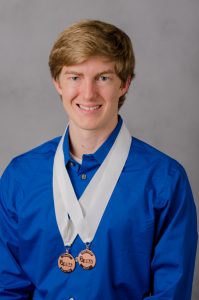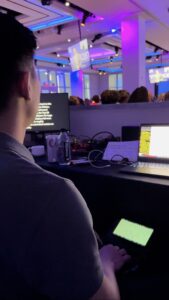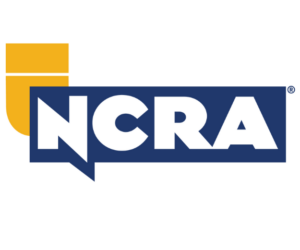
Chase Frazier, RMR, CRR, CRC, started out as a captioner, although his mother and brother, both already court reporters, were in the legal arena. Some recent graduates find going into captioning right away to be a good first step in their careers rather than spending time freelancing or interviewing for open officialships. The JCR Weekly asked Frazier to offer some thoughts on what is different if you plan to consider this option yourself.
What made you decide to go into captioning right out of school?
My realtime in school was exceptional for still being in school. I was realtiming qualifier-level tests for California while still in school. (The California realtime test presents four-voice 200 wpm for ten minutes.) Also, my teacher was kind enough to let me take normal tests as realtime tests. I would immediately email her my test while still in class, and she would print it at home and grade it. Getting that kind of feedback made me love realtime and love the challenge of trying to get every test even more perfect than the last. I still, to this day, try to get each captioning session better than my last.
What kind of equipment did you need to get to start out?
I needed my captioning software, a professional machine, and a modem. I was fortunate to have my parents give me the professional software and a professional machine as a graduation present.
Did you get any additional training before you started captioning?
I didn’t have any training. I researched on my own how to caption TV, the equipment needed, and what tweaks I needed to do to my dictionary. I googled captioning agencies and sent them all an email to try to work for them. None of them responded, except one. But that’s all I needed!
The one that responded vetted me by watching me caption to live news for 30 minutes a day for about a week. After that week, they said that I was good to go live and caption news.
What was challenging for you the first few times you captioned? What did you do to overcome that challenge?
Getting over my nerves was hard for me. It took me a week or two to not be nervous the first few minutes of the broadcast.
What advice would you offer to someone who wants to start captioning from school?
I wouldn’t recommend intensely working on your realtime while in school. Focus on your speed. Your realtime will come with speed. If you can write 200, try to realtime a 160. There are a lot of tricks to improve your realtime.
Also, you don’t have to write out to caption. You can write however you want and have perfect realtime for TV. Just make sure to also have a strong group of prefixes and suffixes. People on TV make up words all the time.
If you want to get your realtime up to par, find a captioner and see if he or she will help you and watch you write once or twice a week. You can share your screen on Skype, and the captioner can watch you write to news. Have that person tell you everything that you can do to improve your realtime. It’s going to be damaging to your ego, but it’s great for your writing.
Chase Frazier, RMR, CRR, CRC, is a captioner in Murrieta, Calif. He can be reached at chaselfrazier@gmail.com.














